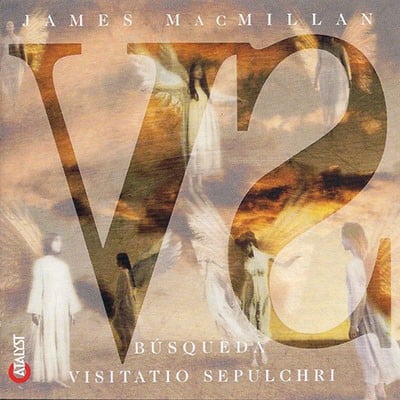OPERA SEARCH
Búsqueda
(1988)Text from Latin Mass and Poems by the Argentinian Mothers of the Disappeared, translated by Gilbert Markus O.P. (L-E)
8 actors, 3 sopranos, speaker
1(=afl).0.3(III=bcl).0-0.3.3(III=ttrbn/btrbn).0-perc(2):I=vib/2tam-t/drum kit/wdbl/2spring coils/sleighbells;
II=lg tam-t/drum kit/maracas/wdbl/2spring coils/sleighbells/claves-2harps-2vlc.db
Abbreviations (PDF)
Boosey & Hawkes
Queen's Hall, Edinburgh
John Shedden, speaker
Conductor: James MacMillan
Company: ECAT Ensemble
The sound of sleeping. Lord have mercy… Men and women wait through the night, fearful of the street executions and kidnap squads. A cry in the darkness. And on earth peace, goodwill towards men… A brother disappeared four years ago and his elder sister counts the weeks and months with their family. Her sons ask ‘What is justice? Does mercy exist? Is it a sin to defend the truth?’ She answers, but is crying. And he became incarnate of the Virgin Mary, and was made man. A son is missing and his mother cradles the memory of his young life. He was crucified for us… The newspapers defend the state and report ‘the mob of madwomen in front of the presidency demanding explanations – measures were taken to disperse them’. Holy, Holy, Holy, Lord God of Hosts… And on the third day he rose from the dead… Thousands have disappeared and the mothers go on weeping, praying, fighting and waiting. Lamb of God, have mercy on us. A daughter is missing and her mother prepares to welcome her miraculous return and soothe away her tortured memories. Grant us peace. The mother will not have waited in vain. The sound of sleeping resumes.
"...music of shattering directness, clearly defined emotion and angry idealism... It is hard to think of another contemporary figure who is so lyrical and dramatic, and yet so thoroughly in command of his material."
The Independent
Búsqueda (in English, Search) was commissioned by the Edinburgh Contemporary Arts Trust in 1988 with subsidy from the Scottish Arts Council as a companion piece to Berio’s Laborintus II. It uses poems by the Mothers of the Disappeared in Argentina, interlaced with the Latin text of the Mass. The work therefore has both political and religious overtones, expressing my interest in both the secular and the sacred, the timeless and the contemporary. Búsqueda draws the audience into a simultaneous experience of the mysteries of the Mass and the turmoil of a political street demonstration. Most importantly, one encounters the private anguish of the Mothers of the Plaza de Mayo, whose poems, translated here by Gilbert Markus and others of Búsqueda (Search), Oxford, express a silent, patient dread of what may have befallen their loved ones, and a growing realisation that the outspoken and indeed unthinkable has indeed taken place.
The music covers a gamut of emotion, conjuring up traditional and contemporary images, ranging from the violence of ‘Crucifixion’ to the hope of ‘Reresurrection’. The Ordinary sections of the Mass (Kyrie, Gloria, Credo, Sanctus, Agnus Dei), are used as structural scaffolding for the development of the piece. The women’s poems are full of religious allusions and are easily placed in an appropriate context. Only the beginning of the Gloria is used, and in the Credo only the most crucial sections are quoted (et incarnatus est . . . crucifixus etiam pro nobis . . . et resurrexit tertia die), this section blossoming into an instrumental and more subjective declaration of faith, highlighting the two cellists as soloists. The work begins as if emerging from a deep, troubled sleep, and the mood subsequently swings from serenity, through elegy, through violence and anger, through devotion and prayerfulness, through euphoria, grief and back to the oblivion of sleep.
James MacMillan
Reproduction Rights
This programme note can be reproduced free of charge in concert programmes with a credit to the composer
Poetic, Tragic

Juliet Stevenson, Ruth Anderson, Charlotte Spink, Anna Bentley, Scottish Chamber Orchestra, James MacMillan
BMG Catalyst 09026626692
(not currently available on sale)
